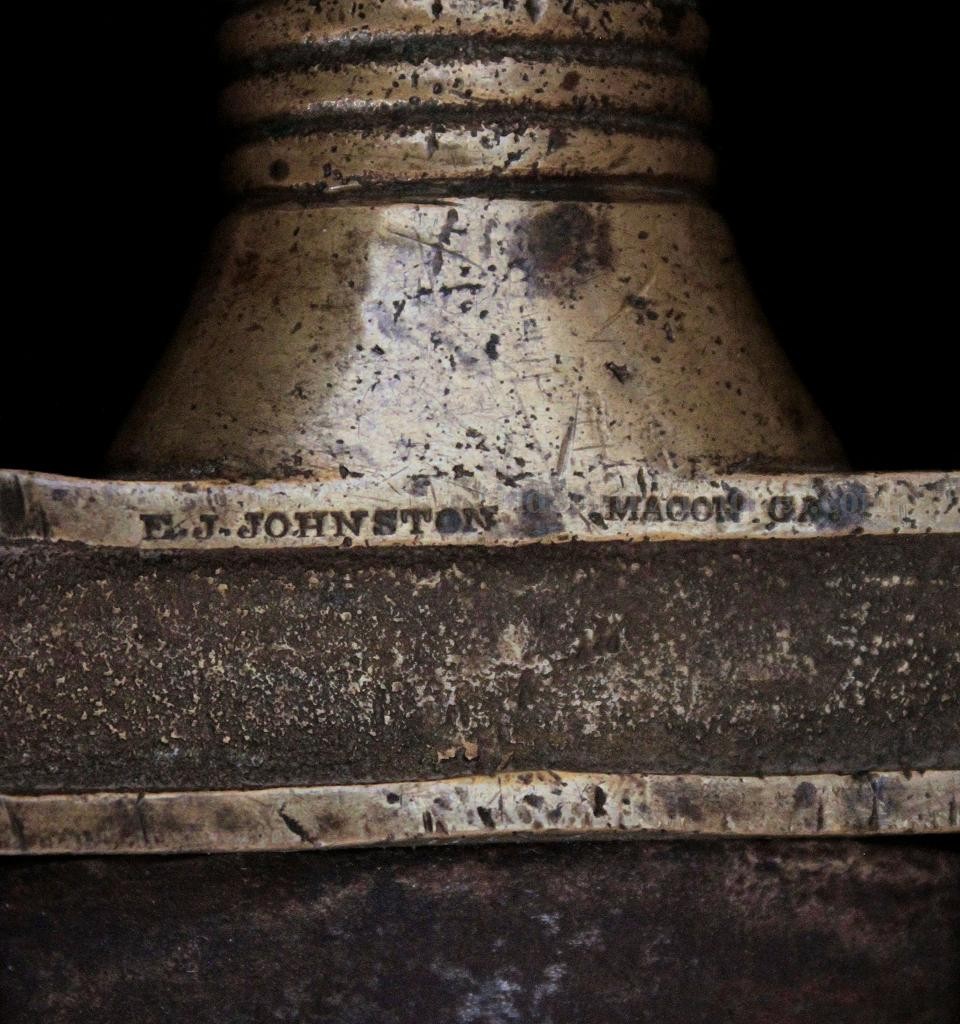
| Catalog | Past Items | Order Info | Terms/Conditions | About Us | Inventory Clearance |
The rare foot artillery sword shown here was made by Edward J. Johnston, a 40 year old wealthy merchant and jeweler of Macon, Bibb County, Georgia. E.J. Johnston & Company worked during the War making high quality edged weapons. All of the company’s products are rare, but especially their maker marked knives and artillery swords like that shown here. The company’s most commonly encountered sword is a beautifully etched and finely made officer’s sword. According to William Albaugh they were turning out 40 naval and artillery cutlasses,(which appear from the wording to have been one and the same pattern, as they referred to them both as cutlasses) 40 infantry swords and 40 cavalry swords per week as of April, 1862. If this was the case, it is odd that more of their products did not survive. I think Mr. Albaugh took the production figures from a newspaper article and it was inaccurate. Neither the surviving records, nor the number of surviving specimens are indicative of such a large output.
The "& Company” of E. J. Johnston has never been revealed, however recently discovered records show that the & Co. consisted of George S. Obear, the Chief of the Macon Fire Department and a 38 year old Massachusetts native. Records also show that in November of 1861 the firm sold one plain and one etched sword for $25.00 and $28.00 respectively; included with these were 1 "folded belt with CS clasp and one belt, bridal leather.” I think this refers to patent leather and single heavy leather belts. These were received and signed for by a Captain of artillery in Richmond, Virginia.
On April 20th 1861 Johnston enlisted in the "Floyd Rifles” Company C, 2nd Battalion Georgia Infantry. He was discharged for disability on the following July 2nd. Though he could not be a soldier, he turned his considerable talents to support the Confederacy; in December of 1861, he supplied the Columbus (Georgia) Artillery with artillery swords like that shown here. That same month he supplied William H. Young with three officer’s swords and belts. His letterhead even at this early date stated that he and Obear supplied "Confederate States Service Swords, Belts”, etc ….. In August of 1862 he supplied 50 artillery sabers to the Macon Arsenal. It is interesting to note, that by December of 1862, though using the otherwise same letterhead, the reference to Confederate States Swords had been removed. In dozens more receipts over the next 9 months there are no recorded sales of swords, but he is renting his building to the Confederacy as an ordnance warehouse and it appears he sold off all, or at least a large amount of his tools and equipment.
Then inexplicably, in September of 1863 the reference to Confederate Swords etc... again appears on his letterhead. This may be because the month before, he and 64 firemen of Macon, known as Captain Obear's Company mustered in as the "Firemen Guard” Company D, 14thBattalion Georgia State Guards. As noted earlier, E.J. Johnston and George S. Obear were partners in their sword making enterprise.
The Confederate Short Sword is modeled after the Roman warrior’s sword of ancient times and more recently the artillery sword of the Napoleonic War era. In fact, I have seen war time billing invoices that actually refer to these short swords as "Roman Swords”. It was originally intended to kill or maim charging cavalry horses, but the War Between the States weaponry rendered such a use impractical. It was likely used more often to slay overly aggressive swine (those that could not get away) or to clear fields of fire for the artillery.
There is just enough play in the grip of this example to hear a "click”, but not enough to feel the movement. The blade has zero pitting, only some surface rust. There are some relatively light nicks along the edge of the blade. This beautiful maker marked example is in very good condition and has a very good maker name and address. It has not been cleaned, sharpened or altered in any way; the tip remains rounded.Copyright © 2025 OldSouthAntiques.com All Rights Reserved.
Privacy Policy | Terms of Use
Powered by Web-Cat Copyright © 1996-2025 GrayCat Systems



